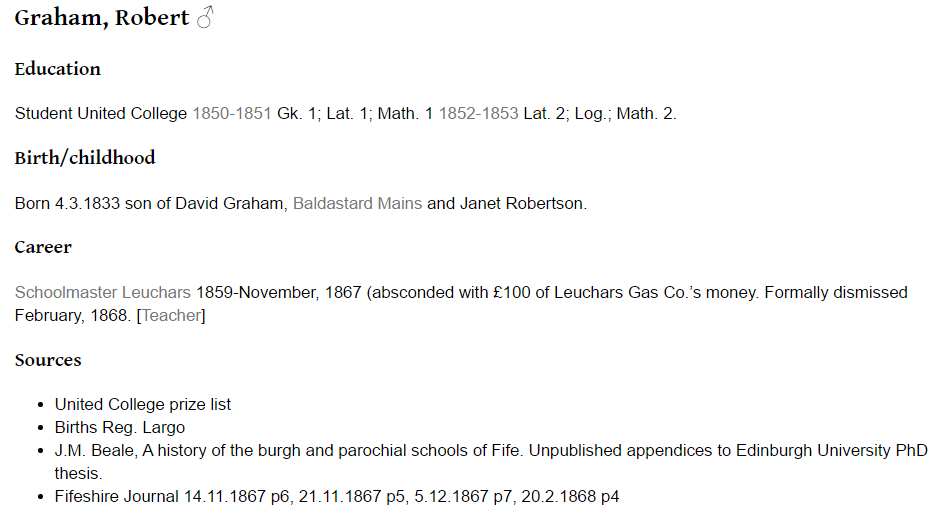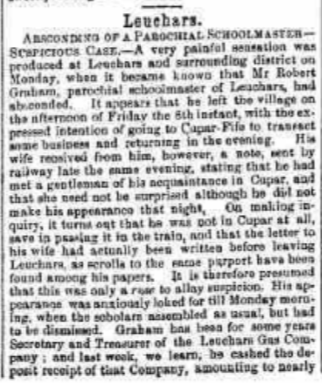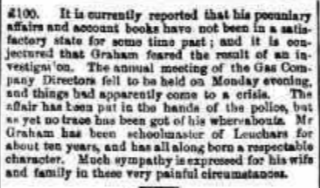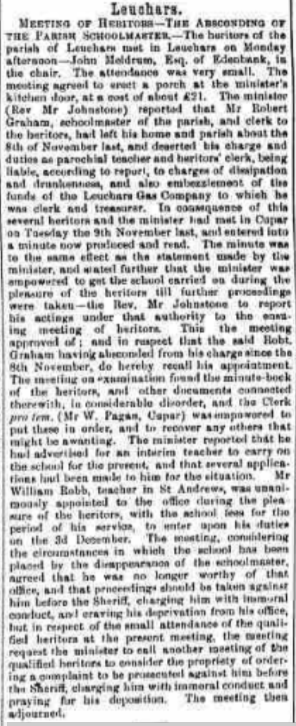|
We've written before about researching graduates, and finding ancestors who went to university in Scotland. The University of St Andrews recently launched a digital biographical register. The database covers almost 12,000 students, and is fully searchable. It is based on Robert N Smart's register, originally published in 2004 in print form. Not only is the new version fully searchable, it includes much information beyond students' time at university. I have strong ancestral connections to East Fife (Ceres, Crail, Abdie and St Andrews), and am also fortunate enough to be a St Andrews' graduate, so naturally I was very interested. I have a copy of James Maitland Anderson's Matriculation Roll (published in 1905), so I was aware that some of my family had studied at Scotland's oldest university. Naturally, I was interested to see if the new register had additional information. I was not disappointed ... My first search was for David Cunningham Graham, something of a black sheep in the family. I knew from the Fasti Ecclesianae that he was minister of Ormiston from 1911 to 1924. The register entry confirmed that he had studied at St Andrews, and showed that he had studied Latin, Greek, Mathematics, English Literature, Chemistry among other subjects, although oddly enough Theology doesn't seem to have been among his studies. Perhaps that might explain why some 20 years after he graduated, he was declared bankrupt while minister at Ormiston, with some suggestion that he might have been a bit too keen on spending other people's money. Another entry that was even more revealing was for David's first cousin once removed, Robert Graham. I knew that Robert had been schoolmaster at Leuchars, but later moved with his family to Glasgow and became an accountant. I'd always assumed that he'd switched jobs to earn more money to raise his growing family. It hadn't occurred to me that he may have had other reasons for his sudden career change, as his register entry shows: So not only do I now know why Robert stopped being a schoolmaster - he clearly didn't have a choice in the matter - I've now got references to some newspaper reports about the circumstances surrounding his departure. A quick check in the Fife Herald for 14 November 1867 leads to the first report: A few days later, the heritors of Leuchars held a meeting, at which there was only one subject up for discussion - the absconding of Robert Graham (Fife Herald 5 Dec 1867): Five weeks later, the Fife Herald carries an advertisement on the front page for a "Roup of household furniture at Leuchars" being held by warrant. Robert's victims clearly didn't wait long to try to reclaim their money. In its 20 February 1868 issue, the Fife Herald reported from the Sheriff Court: Sheriff Court of Fife Fast-forward two months, and Robert's case is heard by the Circuit Court in Perth (Fife Herald, 16 April 1868): Breach of Trust and Embezzlement A quick check of the National Records of Scotland's solemn database reveals that he was indeed declared an outlaw and fugitive on April 13 at Perth. At the time of the 1871 census, his wife Margaret Grant, was living on John Street with three of their children, her sister, and two lodgers. Robert is nowhere to be seen.
He next turns up in the 1881 census, reunited with his wife and two of his children. The family are now living at 9 Ibrox Place, in Govan, and Robert is still at the same address in 1891, although this time without his wife. He was evidently still keen to use his knowledge of maths and numbers generally, as - despite being declared a fugitive for embezzlement - he was working as a book-keeper!
4 Comments
Scotland has a long and proud education tradition. This is often traced back to the Scottish Reformation, which espoused the principle of universal education, with the call for a school in every parish. In practice this didn’t necessarily happen, but at the time it was a fairly radical idea.
But the roots of Scottish education reach back much further than 1560. Several schools still in existence today can trace their origins to the twelfth century (Dunfermline High School, High School of Glasgow, Royal High School Edinburgh, Stirling High School and Lanark Grammar School). Higher education also has a long history in Scotland. Before 1410, Scots had to leave Scotland to obtain a higher education. The most common destinations were England (Oxford and Cambridge), France (Paris and Orleans), and Italy (Bologna), although doubtless some Scots studied elsewhere. An excellent source for these early Scottish students is Donald Watt’s A Biographical Dictionary of Scottish Graduates to AD 1410 (Oxford, 1977). By 1410, the division of the Catholic Church with two rival Popes made it essential to found a seat of higher learning in Scotland itself. A group of masters, mostly graduates from the University of Paris, set about founding an institution in St Andrews, in Fife. Henry Wardlaw, Bishop of St Andrews, granted the school a charter in May 1411. At the time, only the Pope or the Emperor could grant university status, so Bishop Wardlaw wrote to Pope Benedict XIII seeking confirmation. On 28 August 1413, Benedict granted university status to what was now the University of St Andrews in the Bull of Foundation. St Andrews was to remain the only university in Scotland until Pope Nicholas V granted a papal bull to Bishop William Turnbull (a St Andrews graduate), authorising him to establish the University of Glasgow. In February 1495, Pope Alexander VI granted a bull to William Elphinstone, Bishop of Aberdeen and a Glasgow graduate, establishing King’s College in Aberdeen. The last of the four ancient universities of Scotland to be founded, the University of Edinburgh, had a different start in life. Unusually for the time, it was established as a civic institution, by Royal Charter of James VI, in 1582 as the Tounis College. They were to remain the only universities in Scotland for hundreds of years. These days, when around half of school-leavers go on to higher education, it’s easy to forget that for most of their history, universities were for a very few only. My own alma mater, the University of St Andrews, has doubled in size in the 25 years since I graduated. So it’s likely that few of your ancestors would have gone to university. If they did, however, there are records to be found, although they may not provide much information. One very useful source for identifying people who studied at St Andrews is James Maitland Anderson’s The Matriculation Roll of the University of St Andrews 1747-1897 (Edinburgh, 1905). This has been digitised by the Internet Archive and can be found here. The information included is very limited, but it can offer some confirmation that your ancestor studied at the finest university in the world. (That last sentence may contain some personal bias …) For students before 1747, there is Robert N Smart’s Alphabetical Register of the Students, Graduates and Officials of the University of St Andrews 1579-1747 (St Andrews, 2012), although this is not available online. The University of Glasgow has an excellent site dedicated to the history of the University. As well as background information, it includes a database of nearly 20,000 graduates to 1915. Many of these entries contain additional information about the lives and careers of Glasgow graduates. This is an ongoing project and is regularly updated by the University Archive Services, who welcome any contributions of photographs and information about individual graduates. The University of Edinburgh Library and University Collections maintains a database of Alumni. As the site itself acknowledges, it is far from complete. The Special Collections department holds the University archive which includes many other records of university life. There are also some printed registers of graduates which can also help track ancestral students. Several of them are available in digitised versions online: Alphabetical List of Graduates of the University of Edinburgh from 1859 to 1888 A Catalogue of the Graduates in the Faculties of Arts, Divinity, and Law, Of the University of Edinburgh, Since Its Foundation (Edinburgh, 1858) There are also a number of graduate rolls for the University of Aberdeen: Officers and Graduates of University and King's College, Aberdeen, 1495-1860 edited by Peter John Anderson (Aberdeen, 1893). Roll of the Graduates of the University of Aberdeen, 1860-1900 edited by William Johnston (Aberdeen, 1906) Roll of Graduates of the University of Aberdeen : 1901-1925 : with supplement 1860-1900 by Theodore Watt (Aberdeen, 1935) [We are unaware of any online version of this] Roll of Graduates of the University of Aberdeen : 1926-1955 ; with supplement 1860-1925 compiled by John Mackintosh (Aberdeen, 1960) [We are unaware of any online version of this] The individual universities may have additional information on some of their graduates, and it is always worth contacting their alumnus relations departments or libraries/archives to check, although you should always bear in mind that sometimes they may be unable to search their records due to a lack of resources, and that often the records themselves may contain limited information about your ancestors. |
Old ScottishGenealogy and Family History - A mix of our news, curious and intriguing discoveries. Research hints and resources to grow your family tree in Scotland from our team. Archives
November 2022
Categories
All
|
- Home
-
Records
- Board of Supervision
- Fathers Found
- Asylum Patients
- Sheriff Court Paternity Decrees
- Sheriff Court Extract Decrees
- School Leaving Certificates
-
Crown Office Cases AD8
>
- AD8 index 1890 01
- AD8 index 1890 02
- AD8 index 1890 03
- AD8 index 1890 04
- AD8 index 1890 05
- AD8 index 1890 06
- AD8 index 1890 07
- AD8 index 1890 08
- AD8 index 1890 09
- AD8 index 1890 10
- AD8 index 1890 11
- AD8 index 1900 1
- AD8 index 1900 2
- AD8 index 1900 3
- AD8 index 1900 4
- AD8 index 1900 5
- AD8 index 1900 6
- AD8 index 1905 1
- AD8 index 1905 2
- AD8 index 1905 3
- AD8 index 1905 4
- AD8 index 1905 5
- AD8 index 1905 6
- AD8 index 1915 1
- AD8 index 1915 2
- Crown Counsel Procedure Books
- Sheriff Court Criminal Records
- Convict criminal records
-
Workmens Compensation Act Records
>
- Workmens Compensation Act Dundee 1
- Workmens Compensation Act Dundee 2
- Workmens Compensation Act Dundee 3
- Workmens Compensation Act Dundee 4
- Workmens Compensation Act Dundee 5
- Workmens Compensation Act Dundee 6
- Workmens Compensation Act Forfar 1
- Workmens Compensation Act Banff 1
- Workmens Compensation Act Perth 1
- Registers of Deeds
- General Register of the Poor
- Registers of Sudden Deaths
- Anatomy Registers
-
Resources
- Blog
- Contact
- Shop
|
Data Protection Register Registration Number: ZA018996 |






 RSS Feed
RSS Feed
